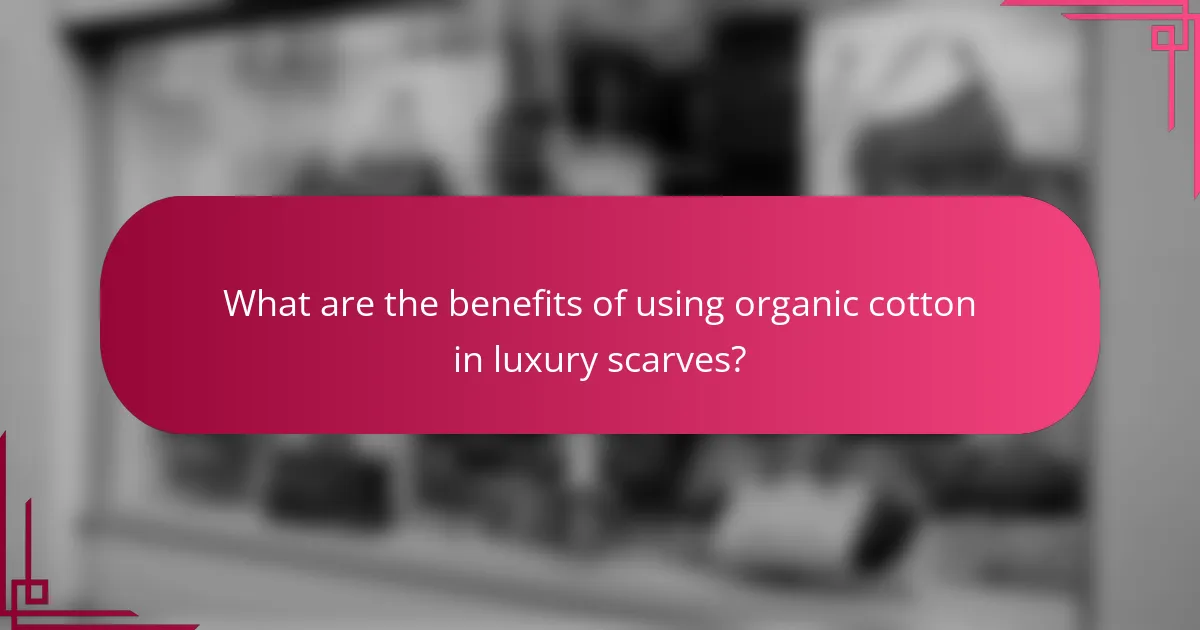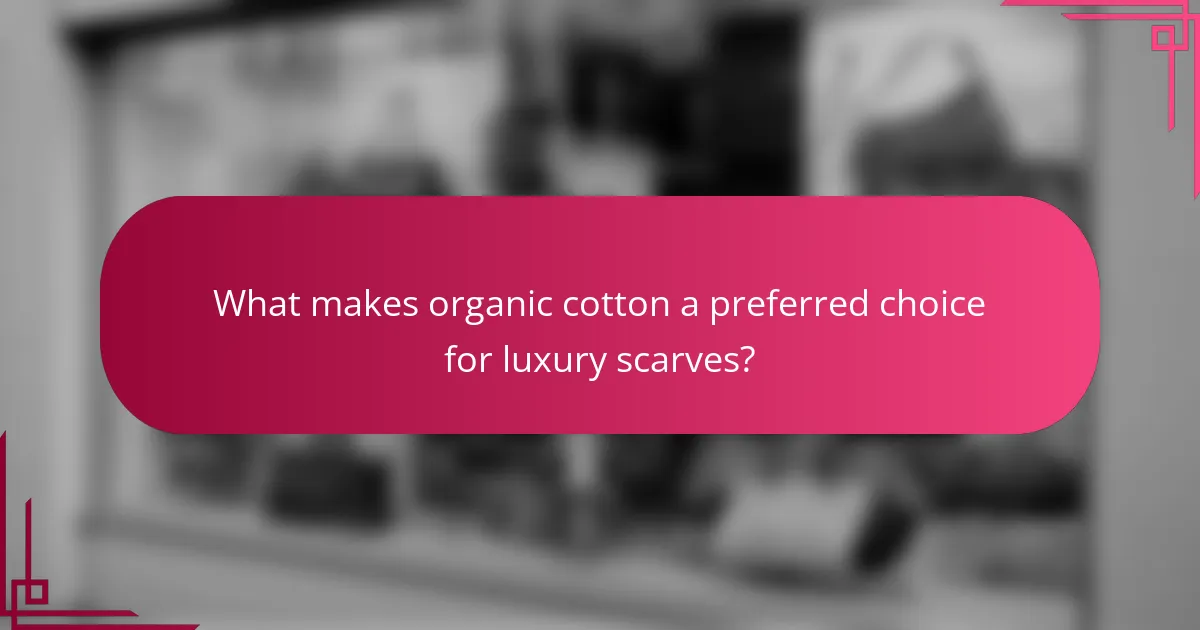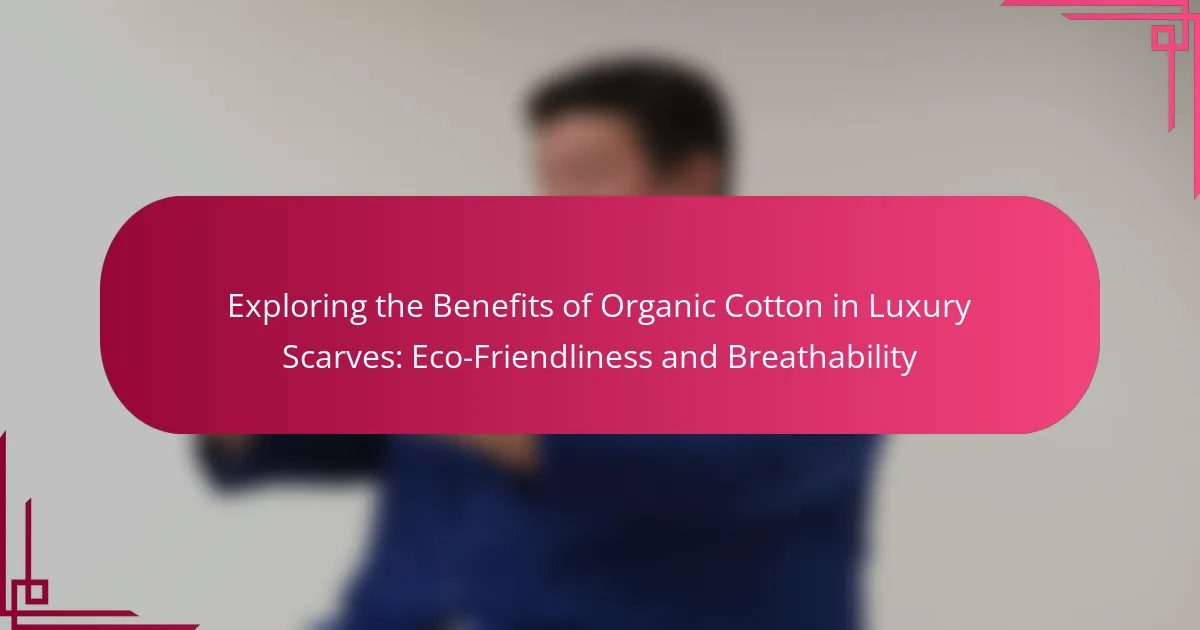Organic cotton is a natural fiber cultivated without synthetic pesticides or fertilizers, making it an eco-friendly choice for luxury scarves. This material is known for its softness, breathability, and durability, enhancing wearer comfort while supporting sustainable farming practices. The production of organic cotton significantly reduces water usage compared to conventional methods, appealing to environmentally conscious consumers. Additionally, certifications like GOTS (Global Organic Textile Standard) help consumers make informed purchasing decisions by ensuring the cotton is sourced sustainably. The article explores these benefits, providing insights into the environmental impact, comfort, and quality of organic cotton scarves.

What are the benefits of using organic cotton in luxury scarves?
Organic cotton in luxury scarves offers several benefits. It is grown without synthetic pesticides or fertilizers. This makes it an eco-friendly choice. Organic cotton is softer and more breathable than conventional cotton. This enhances comfort for the wearer. Additionally, organic farming practices promote healthier soil and biodiversity. Scarves made from organic cotton often have a lower environmental impact. They appeal to consumers seeking sustainable fashion options. Studies show that organic cotton production uses 91% less water than conventional methods. This contributes to resource conservation.
How does organic cotton contribute to eco-friendliness?
Organic cotton contributes to eco-friendliness by reducing harmful chemical usage. Conventional cotton farming employs pesticides and fertilizers that pollute soil and water. In contrast, organic cotton is grown without synthetic chemicals. This practice promotes biodiversity and supports healthier ecosystems. Organic farming methods enhance soil health through crop rotation and composting. According to the Organic Trade Association, organic cotton uses 91% less water than conventional cotton. This significant reduction helps conserve vital water resources. Additionally, organic cotton farming reduces carbon emissions, aiding in climate change mitigation.
What is the environmental impact of conventional cotton compared to organic cotton?
Conventional cotton has a significantly higher environmental impact than organic cotton. Conventional cotton farming uses synthetic pesticides and fertilizers. These chemicals can contaminate soil and water sources. In contrast, organic cotton relies on natural farming methods. This reduces chemical runoff and promotes biodiversity.
Conventional cotton requires more water, contributing to water scarcity in some regions. Organic cotton uses rainwater and sustainable irrigation practices. This leads to lower water consumption overall. Additionally, conventional cotton farming contributes to soil degradation. Organic practices improve soil health and structure over time.
According to the Textile Exchange, organic cotton farming can reduce greenhouse gas emissions by up to 46%. This illustrates a clear advantage for organic cotton in terms of climate impact. Overall, organic cotton presents a more sustainable alternative to conventional cotton.
How does organic farming support biodiversity?
Organic farming supports biodiversity by promoting diverse ecosystems and reducing chemical inputs. It encourages the growth of a variety of plants and animals. This method avoids synthetic pesticides and fertilizers, which can harm non-target species. Organic practices include crop rotation and intercropping, enhancing soil health and habitat diversity. Studies show that organic farms typically have higher species richness compared to conventional farms. For example, a research study published in “Agriculture, Ecosystems & Environment” found that organic farms supported 30% more species. This increase in biodiversity contributes to ecosystem resilience and stability.
Why is breathability important in luxury scarves?
Breathability is important in luxury scarves because it enhances comfort and wearability. Breathable fabrics allow air circulation, preventing overheating. This is especially crucial in varying climates. Organic cotton, commonly used in luxury scarves, is known for its breathability. It absorbs moisture without feeling damp, keeping the skin dry. Studies show that breathable materials can improve overall comfort levels. This is vital for prolonged wear, especially in fashion contexts. Additionally, breathability contributes to the luxurious feel of the scarf. High-quality scarves often prioritize this attribute to ensure a superior user experience.
What properties make organic cotton breathable?
Organic cotton is breathable due to its natural fiber structure and moisture-wicking properties. The fibers are spun loosely, allowing air to circulate freely. This circulation helps regulate temperature, keeping the skin cool. Organic cotton also absorbs moisture effectively, drawing sweat away from the body. This moisture management further enhances breathability. Additionally, the lack of synthetic chemicals in organic cotton contributes to its softness and comfort. These characteristics make organic cotton an ideal choice for breathable textiles.
How does breathability enhance the wearing experience of luxury scarves?
Breathability enhances the wearing experience of luxury scarves by allowing air circulation around the neck. This feature helps regulate temperature, keeping the wearer comfortable in varying climates. Breathable fabrics prevent overheating and moisture buildup. Organic cotton, commonly used in luxury scarves, has natural breathability due to its fiber structure. Studies show that organic cotton can wick moisture away from the skin effectively. This moisture management contributes to a more pleasant wearing experience. Additionally, breathability reduces the likelihood of skin irritation. Overall, breathable luxury scarves provide comfort and enhance usability for daily wear.

What makes organic cotton a preferred choice for luxury scarves?
Organic cotton is preferred for luxury scarves due to its softness and eco-friendliness. This natural fiber is gentle on the skin, making it comfortable for wear. Organic cotton is grown without harmful pesticides or synthetic fertilizers. This cultivation method supports sustainable farming practices. Additionally, organic cotton has excellent breathability, enhancing comfort in various climates. Its durability ensures that luxury scarves maintain their quality over time. The production of organic cotton typically involves less water than conventional cotton. This contributes to environmental conservation, appealing to eco-conscious consumers.
How does the softness of organic cotton compare to other materials?
Organic cotton is softer than many conventional materials, including regular cotton and synthetic fabrics. The softness of organic cotton comes from its natural fibers, which are less processed. This results in a smoother texture that feels gentle against the skin. In contrast, synthetic materials often have a rougher feel due to chemical treatments. Studies indicate that organic cotton can be 20% softer than conventional cotton. Additionally, organic cotton is breathable, enhancing comfort compared to polyester or nylon. This combination of softness and breathability makes organic cotton a preferred choice for luxury scarves.
What are the sensory benefits of wearing organic cotton scarves?
Wearing organic cotton scarves offers several sensory benefits. Organic cotton is soft to the touch, providing a comfortable wearing experience. This fabric is breathable, allowing air circulation, which helps regulate body temperature. The natural fibers of organic cotton are hypoallergenic, reducing the risk of skin irritation. Additionally, organic cotton scarves often have a pleasant, natural scent, enhancing the sensory experience. Studies show that natural materials can positively affect mood and well-being. Overall, these attributes create a sensory-rich experience that is both enjoyable and beneficial.
How does the durability of organic cotton affect luxury scarves?
The durability of organic cotton significantly enhances the quality of luxury scarves. Organic cotton is known for its strength and resilience. This durability ensures that luxury scarves maintain their shape and texture over time. High-quality organic cotton can withstand regular wear without fraying or losing color. Additionally, the durability contributes to the longevity of the scarf, making it a worthwhile investment. Scarves made from durable organic cotton often require less frequent replacement. This aspect aligns with sustainable fashion principles, as it reduces waste. Therefore, the durability of organic cotton positively impacts the overall value and appeal of luxury scarves.
What are the potential drawbacks of using organic cotton in luxury scarves?
Organic cotton in luxury scarves can have several potential drawbacks. One significant issue is the higher production cost. Organic farming practices often require more labor and time, leading to increased prices for consumers. Additionally, organic cotton may have limited availability. This can result in supply chain challenges and potential delays in production.
Another drawback is the durability factor. Organic cotton fibers can be less resilient compared to conventional cotton, potentially leading to quicker wear and tear. Furthermore, organic cotton often requires specific care instructions. This can complicate maintenance for consumers, who may prefer low-maintenance fabrics.
Lastly, the environmental impact of organic cotton farming can vary. While it is generally more sustainable, factors like land use and water consumption still need to be considered. These aspects highlight that while organic cotton has benefits, it also presents challenges in the luxury scarf market.
How does the cost of organic cotton impact luxury scarf pricing?
The cost of organic cotton significantly impacts luxury scarf pricing. Organic cotton is generally more expensive to produce than conventional cotton. This higher cost arises from sustainable farming practices and lower yield rates. Luxury brands often pass these costs onto consumers, resulting in higher retail prices. For example, organic cotton can cost up to 50% more than regular cotton. Consequently, luxury scarves made from organic cotton are priced at a premium. The demand for eco-friendly products also influences pricing strategies. As consumers increasingly value sustainability, brands can justify higher prices for organic cotton scarves.
What challenges do manufacturers face when sourcing organic cotton?
Manufacturers face several challenges when sourcing organic cotton. One significant challenge is the higher cost compared to conventional cotton. Organic farming practices require more labor and time, resulting in increased prices. Limited availability of certified organic cotton also poses a challenge. Many regions do not produce enough organic cotton to meet demand.
Additionally, manufacturers encounter difficulties in ensuring consistent quality. Variations in organic farming practices can lead to differences in fiber quality. Sourcing from multiple suppliers can complicate quality control efforts.
Supply chain transparency is another challenge. Manufacturers must trace the origin of organic cotton to ensure it meets certification standards. This process can be time-consuming and complex.
Lastly, fluctuating market demand can impact sourcing strategies. As consumer preferences shift, manufacturers may struggle to align their sourcing with market trends.

How can consumers make informed choices when purchasing organic cotton scarves?
Consumers can make informed choices when purchasing organic cotton scarves by examining certifications and sourcing practices. Look for products certified by recognized organizations like GOTS (Global Organic Textile Standard). This certification ensures the cotton is grown without harmful pesticides and chemicals.
Check for transparency in the supply chain. Brands that disclose their sourcing practices provide more credibility. Investigate whether the cotton is sourced from sustainable farms. Research the environmental impact of the production process. Organic cotton typically has a lower carbon footprint compared to conventional cotton.
Consider the fabric’s breathability and comfort. Organic cotton is known for its softness and ability to regulate temperature. Read customer reviews to gauge satisfaction and quality. Lastly, compare prices to ensure you are getting value for the quality offered.
What certifications should consumers look for in organic cotton products?
Consumers should look for certifications such as GOTS (Global Organic Textile Standard) and OEKO-TEX Standard 100 in organic cotton products. GOTS ensures that the cotton is grown organically and processed without harmful chemicals. It also mandates fair labor practices throughout the supply chain. OEKO-TEX Standard 100 certifies that the fabric is free from harmful substances. These certifications provide assurance of both environmental sustainability and safety for consumers.
How do different certifications ensure the quality of organic cotton?
Different certifications ensure the quality of organic cotton by establishing strict standards for farming practices. These certifications include Global Organic Textile Standard (GOTS) and Organic Content Standard (OCS). GOTS requires that at least 95% of the cotton is organic and prohibits harmful chemicals. OCS verifies the organic content of the cotton, ensuring traceability from farm to finished product. Certifications also mandate social and environmental criteria, promoting fair labor practices and sustainable farming. Regular inspections and audits are conducted to maintain compliance with these standards. Research shows that certified organic cotton is grown without synthetic pesticides, enhancing soil health and biodiversity. This adherence to regulations guarantees a higher quality product that is safe for consumers and the environment.
What are some tips for caring for organic cotton luxury scarves?
To care for organic cotton luxury scarves, hand wash them in cold water. Use a mild detergent to preserve the fabric’s quality. Avoid bleach, as it can damage the fibers. Gently agitate the water without twisting or wringing the scarf. Rinse thoroughly to remove any detergent residue. Lay the scarf flat on a clean, dry towel to dry. Keep it out of direct sunlight to prevent fading. Store the scarf in a cool, dry place to maintain its shape and texture. Regularly check for any signs of wear or damage to ensure longevity.
How can proper care extend the lifespan of organic cotton scarves?
Proper care can significantly extend the lifespan of organic cotton scarves. Washing them in cold water helps maintain their color and fabric integrity. Avoiding bleach prevents damage to the fibers. Air drying instead of using a dryer reduces wear and tear. Storing scarves in a cool, dry place prevents mold and fading. Regular gentle handling minimizes stress on the fabric. Following these care practices can prolong the life of organic cotton scarves by maintaining their quality and appearance.
What washing and storage practices are recommended for organic cotton?
Organic cotton should be washed in cold water using a gentle cycle. This helps preserve its fibers and color. Use a mild, eco-friendly detergent to avoid harmful chemicals. Avoid bleach, as it can damage the fabric.
For drying, air drying is recommended to prevent shrinkage and maintain quality. If using a dryer, select a low heat setting. Store organic cotton items in a cool, dry place. Keep them away from direct sunlight to prevent fading.
These practices ensure the longevity and integrity of organic cotton products.
The primary entity of this article is organic cotton, specifically its application in luxury scarves. The article outlines the numerous benefits of using organic cotton, including its eco-friendliness, breathability, and comfort. It compares organic cotton to conventional cotton, highlighting its lower environmental impact, reduced water usage, and support for biodiversity. Additionally, the article addresses the sensory benefits of organic cotton, its durability, potential drawbacks, and care tips for maintaining luxury scarves. Overall, it emphasizes the appeal of organic cotton to consumers seeking sustainable and high-quality fashion options.
